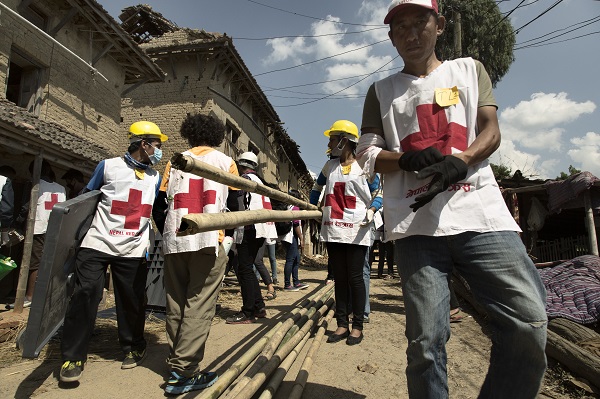Let’s start to close the gap between humanitarian needs and responses

The World Humanitarian Summit (WHS) taking place in Istanbul in just a few weeks is a historic opportunity to begin to bridge the widening gap between humanitarian needs and capacities to respond. Humanitarian actors are increasingly confronted with armed conflicts that are more complex, longer in duration, and wider in regional impact. In addition, the effects of climate change and population growth are increasing the numbers of people that are affected by natural disasters, as extreme weather events become more severe and frequent. The WHS provides an important opportunity for the international community to consider where it must reach further, to address today’s rapidly growing humanitarian needs.
By bringing together governments, humanitarian organisations, people affected by humanitarian crises, and other partners such as the private sector, the WHS aims to renew commitments to humanity, share best practices and innovations, and initiate a set of concrete actions and commitments in order to respond to the most pressing global humanitarian challenges.

As the world’s largest humanitarian network, the International Red Cross Red Crescent Movement (the Movement) has been actively engaged in the WHS consultation process, sharing our expertise in supporting the most vulnerable during disasters and armed conflicts. The perspectives and pledges of the Movement to the WHS highlight the need to improve humanitarian assistance and protect the dignity of every human being, calling on the WHS to deliver significant change to increase the effectiveness of local humanitarian response, while recognising different humanitarian systems, and respecting the complementarity of local, national and international actors. To achieve this, increased investment in strengthening community resilience so that people can better anticipate, cope with, and recover from disasters and hazards will be vital.
While regularly liaising with the EU institutions in preparation for the WHS, the Red Cross EU Office and its members - the International Federation of Red Cross and Red Crescent Societies (IFRC) and Red Cross National Societies in the EU – have also contributed to a series of European Humanitarian Roundtables organised by the European Commission’s Directorate General for Humanitarian Aid and Civil Protection (DG ECHO) in different EU cities. Gathering academia with humanitarian actors, the roundtables provided a forum to develop recommendations and inform the Commission’s position ahead of the Summit. During these meetings, Red Cross participants actively contributed recommendations, especially in relation to access and subsidiary and sexual and gender-based violence. In parallel, several Red Cross National Societies in the EU, as the auxiliaries to their governments, have been preparing for the WHS in dialogue with their government delegations, underlining and explaining the Movement’s positions and priorities.
Given the widening humanitarian-funding gap, an important aspect of the WHS preparations has involved discussions around humanitarian financing. The UN High-level Panel on Humanitarian Financing’s report published in January introduced the "Grand Bargain”; a proposal that major donors and the largest humanitarian organisations commit to making their spending more flexible, efficient, transparent and effective. Having actively engaged in the consultation meetings, the Joint International Red Cross and Red Crescent Movement Paper on the Grand Bargain Movement outline our commitments to prioritising four elements in particular: 1) reducing duplication and management costs, 2) joining the participation revolution, 3) providing greater support to local and national responders, and 4) scaling up the use of cash-transfer programmes where appropriate.
In order for the WHS to achieve its ambitious goals, high-level State representatives and other stakeholders will need to be ready to make concrete commitments at the meeting. The Movement is highly committed to engaging on the whole range of issues that will be discussed at the Summit, and will be represented by 196 delegates, including the President and Secretary General of the IFRC, as well as the President and Director General of the ICRC.
While the Summit itself is an unprecedented event, it marks the beginning of a process that will be followed up in other forums, meetings and discussions. We will continue to collaborate and provide our unique experience and expertise – as auxiliaries to public authorities, with deep roots in communities around the world – to ensure that the highest quality support is delivered to the people and communities that need it most. Following the Summit, we will use our mechanisms to monitor our commitments, including the Council of Delegates and the International Conference of the Red Cross Red Crescent, which gathers Movement and partner organisations, with nearly every government in the world every four years.
For media inquiries, please contact Eva Oyón on: eva.oyon@redcross.eu or +32 2 235 09 22

